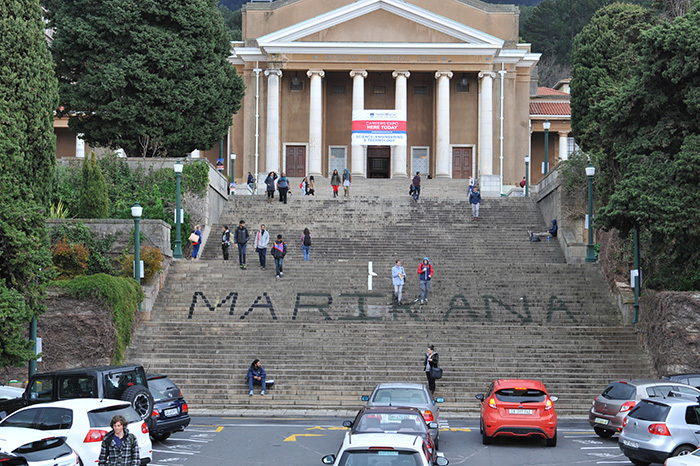Two years on: UCT commemorates Marikana
22 August 2014 | Story by Newsroom
It's been two years since police killed 34 striking mineworkers near Lonmin's Marikana mine outside Rustenburg on 16 August 2012. This week, members of the UCT community commemorated the massacre and debated its structural causes and implications for society.
A screening of Miners Shot Down, the award-winning documentary by Rehad Desai that offers a different narrative to the police's official version of events, kicked off the week's commemorations on 18 August.
Political scientist Andrew Nash shared the podium with Martin Legassick the following day to discuss the aftermath of the massacre, its underlying causes and the implications for UCT and wider society.
For Legassick, a professor emeritus of history at the University of the Western Cape, Marikana was a symptom of a global crackdown on dissidence by states, borne of a "crisis" in world capitalism.
"Capitalism in 2008 went through what's called a financial crisis when banks went bankrupt, and in fact the root of that is the accumulation crisis '“ the inability of capitalists to make profit '“ and as a result '“ they are clamping down on resistance and on protests, and trying to repress it," said Legassick.
Nash, an associate professor in UCT's Department of Political Studies, said that the Marikana massacre showed two images of one society.
"On the one hand, that of increasing repression, increasing short-term gain for a handful; on the other hand, that of a society which is concerned with redeeming the suffering of the past and creating a future in which that suffering is no more."
Nash also critiqued the use of words like "tragedy" for the incident, saying that this implied nobody needed to take responsibility.
Professor Sakhela Buhlungu, dean of the Faculty of Humanities and a noted scholar of labour movements and the mining industry in South Africa, rounded off the week's commemorations when he delivered the university's first annual Marikana Memorial Lecture on 20 August in a packed Centre for African Studies Gallery.
Agreeing that the quest for profit partly caused the killings, Buhlungu suggested that the massacre was rooted in working conditions that post-apartheid governments have failed to change.
"The overarching story about Marikana '“ and this is the story we're not talking about'“ is that the cheap labour system has remained intact in this country," said Buhlungu. "Completely intact. If you look at pay scales '“ it doesn't matter what industry '“ those of us that sit at the higher end of it all benefit from it, because there's just no logic that explains the gap.
"So, yes, it's to protect profits, but also because R12 500 [per month] begins to question, head-on, the cheap labour system. And that's one debate that we really need to have '“ how do we get out of the cycle of cheap labour system in the country?"
The Marikana memorials were arranged by the UCT Marikana Forum and hosted by the university's Centre for African Studies. For more in-depth coverage of this week's commemorations, see September's edition of the Monday Monthly.
Story by Yusuf Omar. Image by Michael Hammond.
 This work is licensed under a Creative Commons Attribution-NoDerivatives 4.0 International License.
This work is licensed under a Creative Commons Attribution-NoDerivatives 4.0 International License.
Please view the republishing articles page for more information.










